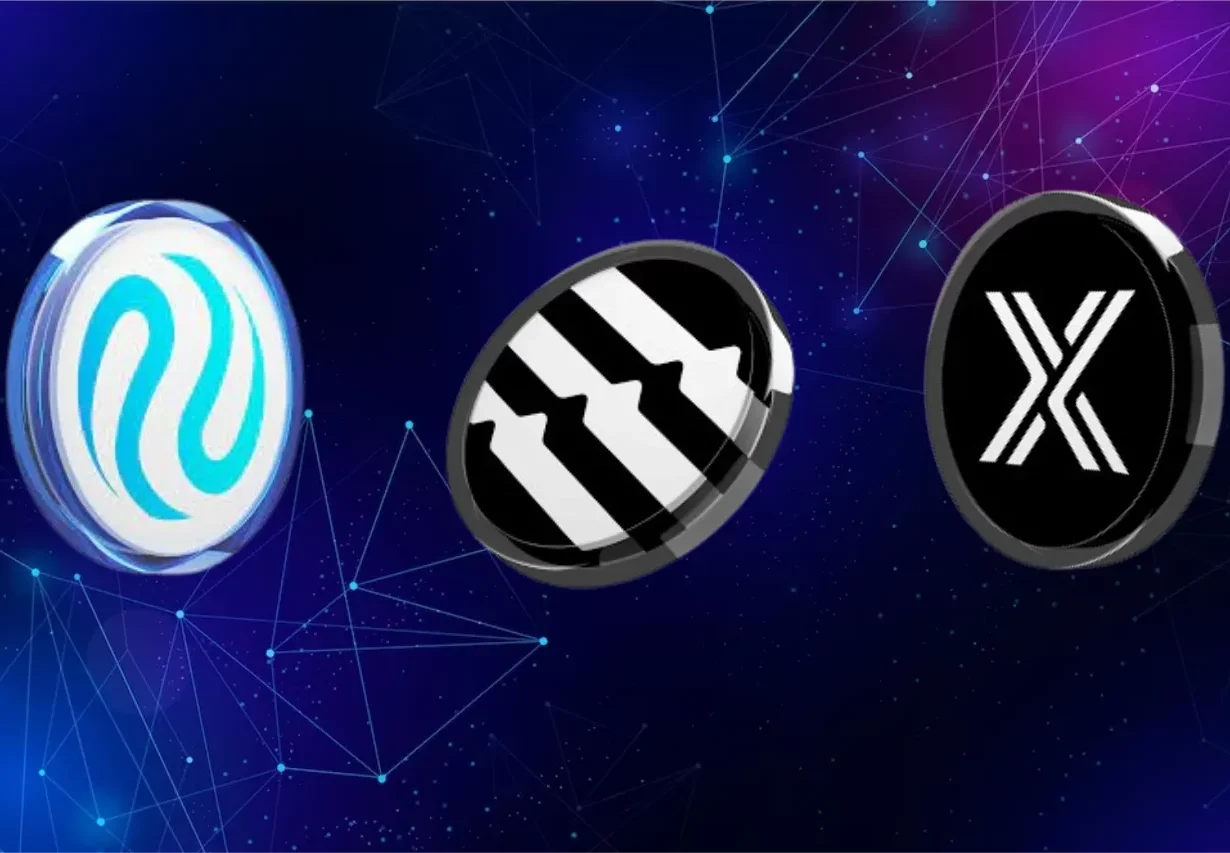In the fast-paced world of blockchain technology, choosing the right platform can be as crucial as the investments themselves. Aptos (APT), Injective (INJ), and Immutable (IMX) are three contenders vying for the spotlight, each with unique features that set them apart. But how do they stack up against each other?
Aptos boasts a highly scalable layer-one blockchain, promising reliability and unprecedented transaction speeds. Meanwhile, Injective Protocol, symbolized by INJ, offers a fully decentralized exchange platform, aiming to empower users with borderless finance. Immutable X, represented by IMX, stakes its claim with a focus on NFTs and gaming, providing a platform for gas-free and instant trades.
As investors and developers look for the best fit, comparing APT, INJ, and IMX becomes essential. They’re not just choosing a cryptocurrency; they’re selecting an ecosystem that could shape the future of decentralized applications and financial systems.
Scalability and Transaction Speed
When evaluating blockchain platforms, scalability, and transaction speed are vital. Aptos leverages a parallel execution engine to process transactions swiftly. In contrast, Injective Protocol excels with its layer-2 speed enhancements, enabling high-performance trading. Immutable X stands out by facilitating gas-free and rapid NFT exchanges.
Each platform’s approach to scalability reveals the commitment to facilitate a seamless user experience in the decentralized ecosystem. Aptos employs novel consensus protocols to sustain high throughput, while Injective leverages optimistic rollups for efficiency. Immutable X’s zero-knowledge proof systems ensure that speed doesn’t compromise security.
Here is a comparative analysis of their transaction capabilities:
| Feature | Aptos (APT) | Injective (INJ) | Immutable (IMX) |
|---|---|---|---|
| Transaction Throughput | 100,000 TPS | 10,000 TPS | 9,000 TPS |
| Consensus Mechanism | Proof of Stake | Proof of Stake | Proof of Stake |
| Scalability Solution | Block-STM | Optimistic Rollup | StarkEx |
| Average Transaction Cost | $0.01 | $0.00 | $0.00 |
| Average Confirmation Time | 1 Second | 2 Seconds | Instant |
The figures provided highlight the technical prowess and user-centric models that these blockchains offer, setting the stage for a competitive decentralized future.
Fully Decentralized Exchange Platform
Aptos, Injective, and Immutable offer decentralized exchange platforms. Aptos prioritizes a trustless ecosystem; Injective endorses permissionless access and interoperability. Immutable focuses on zero gas fees and scalability.
Each platform employs modern crypto frameworks for asset exchange. Aptos uses Move language, injecting security and flexibility into transactions. Injective contributes layer-2 derivatives with cross-chain capabilities. Immutable leverages layer-2 ZK rollups for high-speed NFT trades.
| Feature | Aptos (APT) | Injective (INJ) | Immutable (IMX) |
|---|---|---|---|
| Consensus Mechanism | DiemBFT v4 | Tendermint-based | StarkEx-powered ZK Rollups |
| Interoperability | Moderate | High with cross-chain | Ethereum-compatible layer |
| Language/Framework | Move | Cosmos SDK | Ethereum + StarkNet |
| Scalability Solution | Block-STM parallel execution | Layer-2 scalability with Cosmos IBC | ZK rollup based scalability |
| Average Transaction Throughput | High | High with layer-2 solutions | Extremely high with rollups |
| Average Confirmation Time | Low | Low | Near-instant |
These platforms sustain core decentralization while striving for efficiency. Aptos’ robust framework, Injective’s unrestricted trading, and Immutable’s NFT focused platform contribute to their competitive edge. Each remains attuned to the evolving digital asset demand, amidst the decentralized future of finance.
Focus on NFTs and Gaming
Each blockchain platform under consideration sees NFTs and gaming as integral to their growth. Aptos is leveraging its high throughput and efficient Proof-of-Stake consensus to attract NFT projects and games.
Injective, with its unique layer-2 architecture, emphasizes a seamless gaming experience and low-cost NFT transactions. This approach is tailored to support high-volume gaming dapps.
Immutable aims to simplify NFT trading and gaming on its platform by offering no gas fees and instantaneous trades. Its dedication to scalability is a massive draw for developers in the blockchain gaming sector.
Comparing APT, INJ, and IMX
When examining the scalability of APT, INJ, and IMX, distinct advantages emerge. Aptos boasts a parallel execution engine that can potentially handle upward of 100,000 transactions per second (TPS). Injective, relying on its layer-2 architecture, achieves significant scalability without compromising on security, while Immutable offers a solution tailored for NFTs with instantaneous transaction capabilities.
Scalability and Transaction Speed
| Blockchain | Average TPS | Scalability Solution |
|---|---|---|
| Aptos (APT) | 100,000 | Parallel Execution Engine |
| Injective (INJ) | Data Required | Layer-2 Architecture |
| Immutable (IMX) | Instant Transactions | NFT-Centric Scaling |
Each platform optimizes performance in its specific context. Aptos and Immutable stand out for their high throughput which caters seamlessly to their target markets in NFT and gaming. Injective differentiates itself through its interoperable layer and permissionless nature.
| Blockchain | Gas Fees | User Experience Metric |
|---|---|---|
| Aptos (APT) | Competitive | Simplified Interaction |
| Injective (INJ) | Low to None | Frictionless Access |
| Immutable (IMX) | Zero | Instant Trades |
Users typically prefer platforms that balance cost-efficiency with a smooth user experience. Immutable takes the lead with zero gas fees while Aptos and Injective attract users through competitive fees and ease of use, respectively.
Strikingly, each blockchain network leverages its unique technology to offer a compelling ecosystem for decentralized exchange, highlighting the diversity and specialization in the blockchain sector.
Shaping the Future of Decentralized Applications and Financial Systems
Blockchain technology is redefining the landscape of digital applications and financial systems. Aptos, Injective, and Immutable each offer unique functionalities that cater to the growing appetite for decentralized solutions. With the convergence of these technologies, the sector is brimming with innovative possibilities.
Each platform’s distinct approach serves different market needs and paves the way for widespread adoption. Users can expect enhanced performance and flexibility as these platforms evolve, making decentralized applications more accessible and user-friendly.
Moreover, the dynamic interplay between these blockchains is setting new standards for transaction efficiency and cross-chain interoperability. This progress signals a strong future for decentralized finance and applications where users have unmatched control over their digital interactions.
Conclusion
Aptos, Injective, and Immutable each bring distinct advantages to the blockchain space, tailoring their technologies to meet the needs of users and developers. Aptos stands out with its efficient Proof-of-Stake consensus and high throughput, which are key for NFT projects and gaming applications. Injective’s layer-2 architecture and focus on a seamless gaming experience offer low-cost transactions, appealing to a broad audience. Immutable’s no gas fees and instant trades provide a compelling platform for those looking to trade NFTs and engage in blockchain gaming without the usual overhead. While they each target different aspects of the decentralized market, their innovative approaches to scalability, transaction speed, and user experience set them apart as frontrunners in the race to redefine digital asset transactions and decentralized applications. As the blockchain landscape continues to evolve, the competition between these platforms is likely to spur further innovation, benefiting users and shaping the future of DeFi and blockchain-based gaming.
Frequently Asked Questions
What are Aptos, Injective, and Immutable?
Aptos (APT), Injective (INJ), and Immutable (IMX) are blockchain platforms each offering decentralized exchange capabilities. They differ in their focus areas: Aptos emphasizes trustlessness, Injective offers permissionless access and interoperability, and Immutable focuses on zero gas fees and high scalability.
How do Aptos, Injective, and Immutable compare in scalability?
The article compares their scalabilities based on their unique architectures: Aptos uses high-throughput Proof-of-Stake consensus, Injective leverages a unique layer-2 solution, and Immutable uses a dedicated scalability protocol for instant trades and no gas fees.
What is the average transaction speed of each blockchain platform?
Each platform boasts different transaction speeds: Aptos focuses on high throughput, Injective prioritizes seamless and low-cost transactions with its layer-2 architecture, and Immutable aims for instantaneous trades with no gas fees.
Which blockchain platform is best for NFT and gaming?
The article suggests that Aptos attracts NFT projects with its throughput and proof-of-stake consensus, Injective offers a seamless experience for gaming and NFT transactions, and Immutable caters to developers with no gas fees and instant trades, but doesn’t designate a single best platform as it depends on specific needs and priorities.
What consensus mechanisms do Aptos, Injective, and Immutable use?
Aptos uses Proof-of-Stake for its consensus mechanism, Injective operates on a proof-of-stake variant tailored for layer-2 solutions, and Immutable hasn’t been specified, but aims for zero gas fees and scalable transactions.
Why do these platforms focus on decentralization and efficiency?
They aim to maintain core decentralization while striving for efficiency to meet the evolving demands of digital assets, allowing for enhanced performance, flexibility, and user-friendly experiences.
How do these blockchain platforms facilitate cross-chain interoperability?
The platforms employ different strategies for interoperability: Aptos is trustless, Injective promotes permissionless access with its unique architecture, and Immutable focuses on scalability which indirectly supports smoother cross-chain interactions.
What unique advantages do Aptos, Injective, and Immutable offer?
Aptos offers high throughput and an efficient Proof-of-Stake consensus, Injective has a seamless low-cost layer-2 architecture for gaming and NFTs, and Immutable provides no gas fees and instantaneous trades, each targeting different market needs.



Leave a Reply